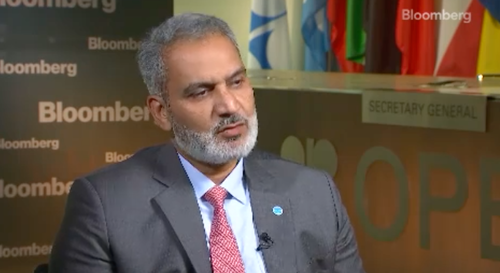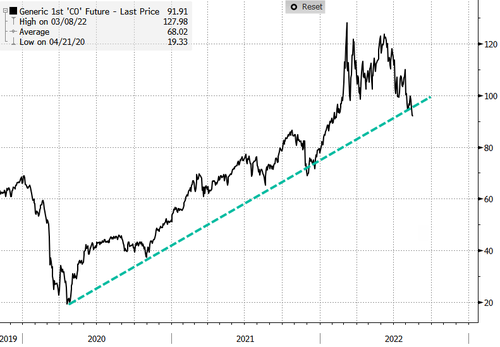“Running On Thin Ice”: OPEC Head Warns Of Oil Squeeze
Crude oil prices have slumped to six-month lows, driven by a mounting wall of worries: US recession, China’s zero-Covid policy and real estate sector implosion, Russian production recovering, US SPR releases, and the possibility of a nuclear agreement between Iran, the EU, and the US that could unleash new supplies into global markets.
On Wednesday morning, the October contract of Brent on the Intercontinental Exchange tagged a six-month low of $91.58 a barrel while the new head of OPEC offered a sobering reality that global oil markets face an increased risk of a supply squeeze due to declining spare production capacity.
OPEC Secretary-General Haitham Al-Ghais sat down with Bloomberg Television and said speculation fears over slowing consumption in China and the rest of the world had been greatly exaggerated.
Al-Ghais said producers in OPEC are nearing the upper limits of additional supplies they can deliver to the market:
“We are running on thin ice, if I may use that term, because spare capacity is becoming scarce. The likelihood of a squeeze is there.”
None of this should come as a surprise to readers, as we pointed out in June that WSJ’s energy correspondent Summer Said that Saudi Arabia’s production stands around 10.5 million bpd and has a production capacity ceiling of 12 million bpd. That means the potential output increase is only 1.5 million bpd. And another million bpd in five years. In other words, the Kingdom’s ability to increase spare capacity appears limited.
And here’s where things get interesting: Al-Ghais remains confident global oil demand will increase by 3 million barrels per day as China reopens from Covid-related lockdowns.
“China is still a source of phenomenal growth,” he said. “We haven’t seen China open up exactly — there’s a strict Covid Zero policy — I think that will have an impact when China gets back to full steam.”
As explained by the OPEC head, the reason for a production capacity ceiling is that “chronic underinvestment for several years is really what’s taken us to where we are today.”
On the subject of additional flows from Iran, he said that as long as they are released orderly, global oil demand will absorb those supplies.
Ahead of the next OPEC+ meeting on Sept. 5, Al-Ghais said it’s still too early what the 23-nation group will agree on:
“We’ve demonstrated time and time again in the past that we’re willing to do whatever it takes to do what the market really requires,” Al-Ghais said.
So the takeaway here is more confirmation that spare production capacity and rising global fossil fuel demand could squeeze markets when China reopens.
Goldman Sach’s Damien Courvalin still maintains a 3mo $125 a barrel and 6mo $130 a barrel Brent price targets.
Watch the full Bloomberg interview:
Tyler Durden
Wed, 08/17/2022 – 09:04
via ZeroHedge News https://ift.tt/y3GJaN8 Tyler Durden

